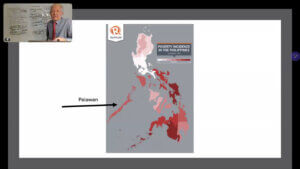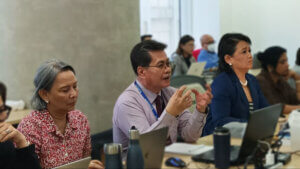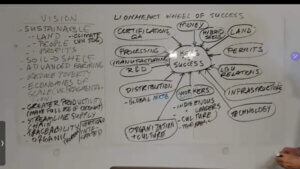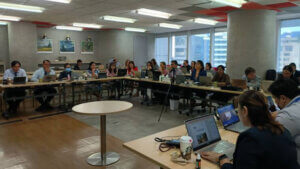Agriculture in the Philippines plays a significant role in the country’s economy, with 42.54% of land dedicated to farming in 2022, amounting to about 10 million hectares. The sector employs around 25% of the workforce, particularly in rural areas where staple crops such as rice, corn, coconut, and sugarcane are produced. Despite its importance, agriculture contributes minimally to the nation’s GDP, highlighting low productivity. The industry faces numerous challenges, including climate change, slow technology adoption, and high fertilizer costs. Compounding these issues, an aging farming population and the appeal of more lucrative career paths deter younger Filipinos from pursuing agriculture, which is vital for the country’s food security.
In the second session of our Executive MBA, we explored how agriculture can challenge this stereotype by focusing on sustainability and innovation.


Introduction to Lionheart Farms
Lionheart Farms, a large-scale, vertically integrated coconut plantation, was founded by Danish entrepreneurs Christian E. Moeller and Anders Haagen. Sharing a passion for agriculture, they decided to focus on coconut trees, known as the “tree of life” for their numerous uses. The farm was established in Rizal, a municipality in southern Palawan, a province renowned for its natural beauty but also marked by poverty and underdevelopment, particularly in its rural areas.
With a poverty rate of 65%, the region’s indigenous people historically relied on farming, kaingin (slash-and-burn), and charcoal production for sustenance. However, Lionheart Farms aimed to advance coconut farming by integrating technology, fostering sustainability, and improving the local community’s welfare.

Lionheart’s Success Formula
-
Investment
Starting a venture in a remote area required substantial capital. Lionheart Farms needed $35 million to establish the farm. Initial investments from shareholders covered $14 million, but slow disbursement from the Development Bank of the Philippines (DBP) prompted the founders to seek alternative funding. Eventually, with Swiss partners, they raised the necessary funds, acquiring the land and machinery needed to launch operations.
-
Land and Community Engagement
The land in Rizal posed two challenges: it was largely owned by indigenous people, and some areas were designated as protected by the Department of Environment and Natural Resources (DENR). Instead of displacing communities or damaging the environment, Lionheart identified open spaces for planting and negotiated agreements with local Indigenous Peoples (IPs) for land use. Through their “Kabalikat Farming” program, 40,000 coconut palms were managed by small-scale farmers in three barangays, empowering local communities.
-
Regulatory Compliance
Lionheart Farms made compliance a priority. They worked with local government units to secure the necessary permits and adhered to audits and environmental regulations. The farm signed an agreement with the DENR and committed to implementing an Agroforestry Development Plan, which not only focused on coconut trees but also integrated other local tree species to preserve biodiversity.
-
Hybrid Coconut Trees
Lionheart Farms opted for hybrid coconut trees, which offer both resilience and productivity. These trees are more resistant to harsh weather conditions and pests, making them a sustainable choice. This decision ensured better yields while adapting to the impacts of climate change.
-
Infrastructure Challenges
When the farm began operations, the southern area of Rizal was underdeveloped. There were no roads, bridges, or power supply. Lionheart Farms addressed these gaps by constructing the necessary facilities, ensuring smooth operations, and connecting the plantation to vital resources.
-
Streamlined Supply Chain
Unlike many farms, Lionheart Farms operates with a vertically integrated supply chain. Processing plants are located within the plantation, allowing for flexibility and efficiency. They adopted Korean Natural Farming techniques, reintroducing indigenous microorganisms to enhance soil quality. The farm produces its own biofertilizers and biopesticides from byproducts and focuses on higher-value products such as coconut sugar, syrup, vinegar, and aminos, rather than traditional copra.
-
Quality Assurance
To expand internationally, Lionheart Farms sought to meet global standards. At the time of writing, the farm was undergoing audits from several international certification bodies, including the Global Food Safety Initiative (GFSI), the British Retail Consortium (BRC), and organic standards from the US, EU, and Japan. This commitment to quality ensures that Lionheart’s products are recognized globally.
-
Strategic Partnerships
To tackle the challenges of marketing and distribution, Lionheart Farms formed strategic partnerships. These collaborations helped in packaging and ensuring that their products reached both local and international markets effectively.
-
People and Culture
The most critical element of Lionheart’s success is its people and the inclusive culture it fosters. Instead of imposing their foreign values, Moeller and Haagen took the time to understand the local community’s culture and integrate it into their operations. They prioritized creating job opportunities for locals, reducing the poverty rate from 65% to 25%. Additionally, they established an academy to upskill Indigenous Peoples (IPs), empowering them for roles within the farm and ensuring a diverse, learning-oriented workforce.
Conclusion: Coconut, Community, and Continuity
Lionheart Farms’ story highlights the power of sustainable farming and community involvement. Their innovative approach to agriculture, coupled with a commitment to environmental sustainability and social responsibility, showcases how agriculture can thrive in the Philippines despite its challenges. As Lionheart Farms continues to grow, it demonstrates that the future of agriculture doesn’t have to be a choice between profit and sustainability—it can be about weaving together coconut, community, and continuity.

Take the Next Step Toward Sustainable Growth
Lionheart Farms’ success story highlights how innovation and sustainability can transform industries and communities. If you’re inspired to create impactful projects like this or need expert guidance in finding top talent for your organization, John Clements Consultants is here to help. With decades of experience in executive search and workforce solutions, we can connect you with professionals who drive meaningful change.
Ready to make a difference? Contact us today to start building a sustainable future for your business!





